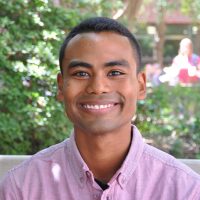On the frontlines of the pandemic
November 17, 2021

Dr. Joseph Engeda
When Joseph Engeda, PhD, first enrolled at UNC Gillings School of Global Public Health to earn his doctoral degree in epidemiology, he planned on studying risk factors for cardiovascular disease.
But his first job after Carolina focused on a much different problem.
Engeda graduated in 2019 and returned to his home state to work at the California Department of Public Health in early 2020. Three months after starting his new job, he found himself on the frontlines of the COVID-19 pandemic.
Engeda talks about his experiences at Carolina and the challenges of starting a career in public health during a pandemic.
What attracted you to the Gillings School of Global Public Health? Why did you decide to pursue your doctoral degree at Carolina?
Since I did my undergrad and master’s degree at [the University of California] Berkeley, I thought I would do my PhD there as well. But I realized their program was too small. I was looking for a larger cohort because I wanted to meet as many people as possible.
Within epidemiology, there are different areas of focus, and I was always interested in studying cardiovascular disease — that was my focus during my master’s. I was drawn to it because many of the risk factors for cardiovascular disease, like obesity and diabetes, seem so preventable. The cardiovascular program at Gillings is very strong.
What were some of your best experiences during the doctoral degree program?
I really liked the program. I was able to make a lot of good connections and great friends. Many people in my cohort were transplants as well, so we all bonded through learning how to navigate Chapel Hill together.
As a student, you are given a large degree of freedom. You’re tasked with coming up with a research topic or question, and you have to navigate how to get resources and how to move forward. You receive some guidance, but you also make mistakes and find your way on your own. And I think it’s good practice because that experience is essential once you get into the real world — you need to know how to navigate those pathways.
Within the cardiovascular disease group, there were a lot of grants to send students to conferences. I was able to go to a conference every year, which gave me a chance to present, hear lectures and get some exposure to the real world while I was still a student. I don’t think I could have gotten that experience if I hadn’t gone to Carolina. Having that established structure made a big difference.
You began your job at the California Department of Public Health in January of 2020. How did the pandemic impact your work?
I don’t think anything could have prepared me for what happened in March. In the beginning, we dropped everything to respond to COVID-19. We were overwhelmed.
My team was tasked with tracking COVID cases on the Grand Princess cruise ship that came into port in Oakland, California, the second week of March. It was our job to help keep track of the different passengers and crew members who were still on the ship or had been transported to military bases or hospitals. We also had to document every person who had contact with those passengers. It was an immense amount of data management and very difficult.
Eventually, my work expanded to track people who were testing positive across different counties in California and other states. I also did research on outbreaks in nursing homes.
Once we got more volunteers and hired more people to specifically work on COVID, the workdays got better. The management did a good job of rotating people in and out of COVID shifts.
How has your career shifted since the start of the pandemic? How has your connection to the UNC Gillings School of Global Public Health persisted?
I recently left the California Department of Public Health to join DLH, a private company that provides consultants to different government agencies. One of my friends from Gillings told me about the job, so the networking opportunities I was looking for at the beginning of my PhD program really worked out.
It’s helpful to have the Carolina experience and connections because everyone in this field knows about the epidemiology program. If you’re a graduate, employers trust that you’ll have the skillsets they need, and that’s been a great entry point.
I’m still interested in going back to work in government one day, maybe when COVID is over.
Contact the UNC Gillings School of Global Public Health communications team at sphcomm@unc.edu.
